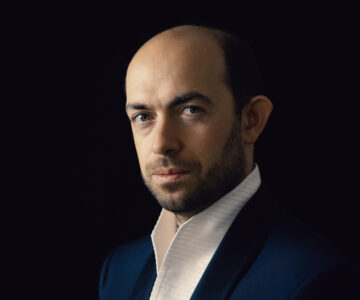(OC) ★★★★ BBC Music Magazine, 2018
“Respectful of style, endowed with a fertile imagination, this deep, subtle performer, architect of sound, delivers a vision where intelligence rivals spontaneity.”
– Michel Le Naour – Cadences
François Dumont is the laureate of some of the most prestigious international competitions: the Chopin Competition, the Queen Elisabeth Competition, the Clara Haskil Competition, and the Monte-Carlo Piano Masters. He has been nominated for the Victoires de la Musique in the ‘instrumental soloist’ category and received the Prix de la Révélation de la Critique Musicale Française.
François Dumont was chosen by Leonard Slatkin to perform and record both of Ravel’s piano concertos with the Orchestre National de Lyon as part of their complete Ravel cycle. The album, released by Naxos, was warmly received by critics: “A very accurate vision of the two concertos; perfect classical clarity in the G major concerto… the Piano Concerto for the Left Hand, powerful, even heartbreaking,” writes Jacques Bonnaure in Classica.
He has also performed with the Cleveland Orchestra, the Mariinsky Theatre Orchestra, the Monte-Carlo Philharmonic Orchestra, the Orchestre National d’Île-de-France, the Warsaw Philharmonic Orchestra, the Orchestre National de Lille, the Orchestre National de Lorraine, the Nice Philharmonic Orchestra, the Colombian National Orchestra, the Orchestre Pasdeloup, the Orchestre des Pays de Savoie, the Orchestre National des Pays de Loire, and the Lausanne Chamber Orchestra, working with conductors such as Jesús López-Cobos, Mykola Diadiura, Roberto Fores-Veses, David Reiland, François-Xavier Roth, Aziz Shokhakimov, Alexander Sladkovsky, and Antoni Wit.
Born in Lyon, he studied with Pascale Imbert, Chrystel Saussac, and Hervé Billaut. At the age of fourteen, he entered the C.N.S.M.D. in Paris in Bruno Rigutto’s class. He further refined his skills at the Como International Academy and the Lieven Piano Foundation with Dmitri Bashkirov, Leon Fleisher, William Grant Naboré, Murray Perahia, Menahem Pressler, Andreas Staier, and Fou Ts’ong.
François Dumont regularly performs recitals at prestigious festivals such as Piano aux Jacobins in Toulouse, the Roque d’Anthéron Festival, the Chopin Festival in Nohant, the Chaise-Dieu Festival, the Lisztomanias in Châteauroux, the Chopin Festival in Paris, the Radio-France Montpellier Festival, the Besançon Festival, the Epau Festival, the Nuits Musicales in Uzès, the Nuits du Suquet in Cannes, the Grands Concerts in Lyon, the Chopin Festival in Geneva, the Vézère Festival, the Folles Journées in Nantes, the Sociedad Filarmónica in Bilbao, the Música – Musika Festival in Bilbao, and the Kennedy Center in Washington. He is regularly invited to China, Japan, and South Korea. His solo discography includes the complete Mozart Piano Sonatas (Anima Records), a Chopin album, two Bach albums (Artalinna), a Wagner/Liszt album (Piano Classics), a double live album of the Chopin Competition (published by the National Chopin Institute of Warsaw), and the complete piano works of Maurice Ravel (Piano Classics). He has recorded a series of Mozart concertos, about which the press has praised his “cantabile and inspired playing, with a profound understanding of detail” and “a perfect synergy with the musicians.”
His recording of Chopin’s Nocturnes has been highly praised: “In a very crowded repertoire, that of Chopin’s Nocturnes, pianist François Dumont joins the ranks of the greatest. From this essential body of the composer’s music, he offers a vision of rare coherence.” His album dedicated to Fauré’s Nocturnes, recorded on a 1922 Gaveau piano, received the highest accolade, the “Supersonic” award, from the Luxembourg magazine Pizzicato.
In 2022, the pianist released an album dedicated to Chopin’s Ballades and Impromptus, as well as a disc featuring César Franck’s Quintet and Dvořák’s “American” Quartet, in collaboration with the Pražák Quartet.
In 2024, François Dumont recorded his first duo album with cellist Marc Coppey, where they interpret works by Gabriel Fauré. In November 2024, he released his album “Debussy, Clair de Lune”, recorded on the piano of Debussy preserved at the Brive-La-Gaillarde Museum. The album received critical acclaim and prestigious distinctions, such as the Choc Classica: “The instrument touches your heart, but it is the pianist who gives it magic.”
He enjoys performing chamber music with Sayaka Shoji, Marc Coppey, Laurent Korcia, Augustin Dumay, and the Pražák Quartet. He has been forming a duo with soprano Helen Kearns since 2003.
During the 2024-2025 season, he will perform at the Salle Gaveau, with the ONB under the direction of Nicolas Ellis, with the Orchestre d’Auvergne conducted by Thomas Zehetmair, and on tours in Japan (2024) and Chile (2025).
(OC) ★★★★ BBC Music Magazine, 2018






